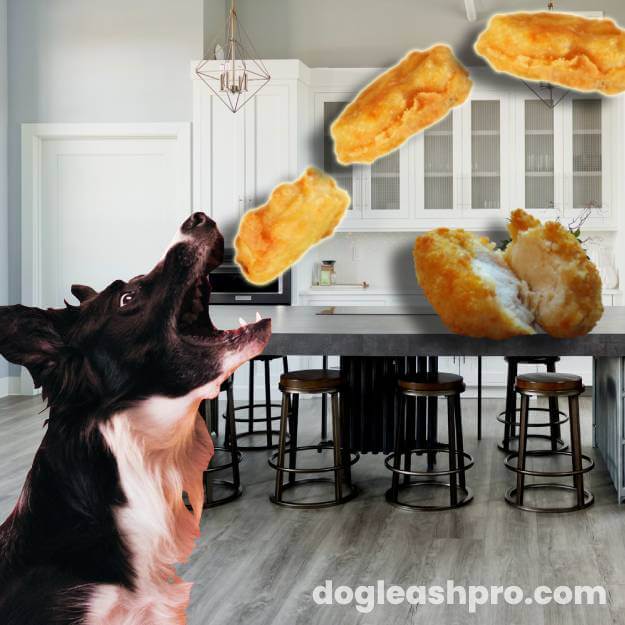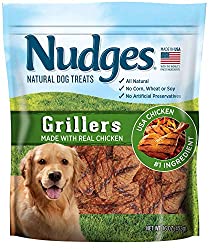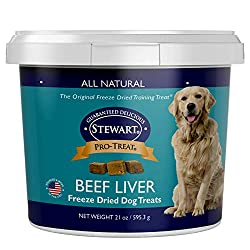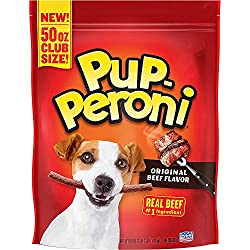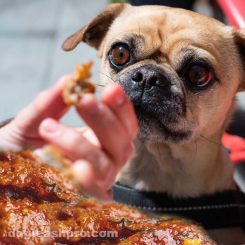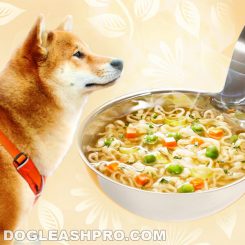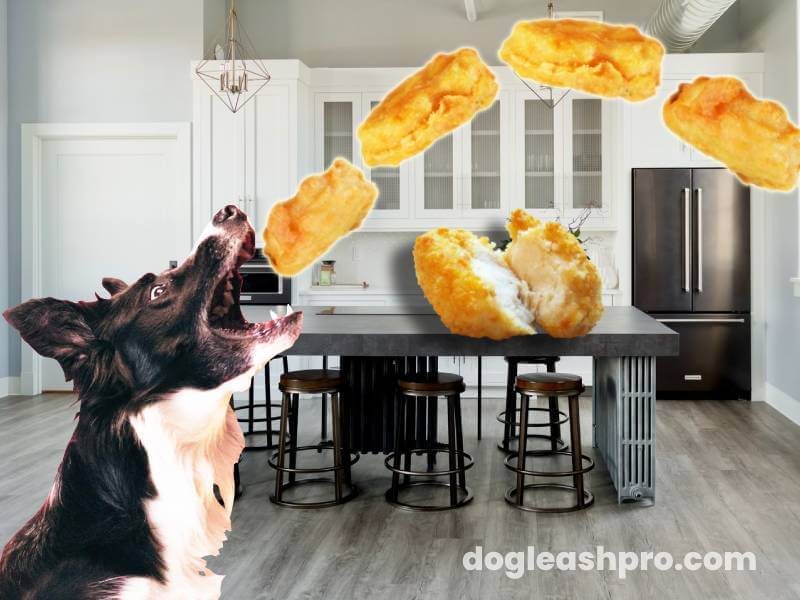
No, dogs should not eat Chicken nuggets. Although Chicken nuggets are not toxic, this food is far from an ideal meal for your canine friends. This fried food is packed full of fats and salt, which are both harmful to dogs. Keep Chicken nuggets away from your pooch or remove the fried breading first before feeding them the nuggets. If it’s the last resort, then it should be fine but keep in mind that Chicken nuggets do not provide much nutritional value when compared with regular plain chicken meat.
Similar to Hash browns, Chicken nugget is also commercialized, served in many fast-food restaurants, has preservatives, and contains tons of oil that are bad for dogs, namely trans and saturated oil.
Let’s discuss this fast food in more detail and find out what they are made of.
Table of Contents
What are Chicken Nuggets?
Chicken nuggets are bite-sized, deep-fried snacks made from chicken mince. They are processed and offer very little nutritional value. They’ve been a staple at fast-food restaurants for decades.
For instance, Chicken nuggets are a popular fast food item sold in many fast-food chains globally, including McDonald’s, KFC, Wendy’s, Burger King, Chick-Fil-A, Popeyes, and many others. They are also available frozen for you to cook at home.
What are Chicken nuggets made of?
While different manufacturers use slightly different ingredients, Chicken nuggets are generally made of the following:
- Chicken parts.
- Flour.
- Eggs.
- Starch.
- Oils.
- Preservatives.
- Salt.
- Pepper.
- Sugar (or sugar substitutes).
- Various spices.
The chicken parts that go into chicken nuggets include chicken meat and fat, with traces of skin, nerves, veins, cartilage, and bones.
How are Chicken nuggets made?
Chicken meat is ground into a lean mince and mixed with salt, pepper, and other flavorings. Bits of chicken skin are also added to give the nuggets a chewy texture.
After mixing all the ingredients, the mince is shaped into nugget-sized bits, which will then be battered and breaded.
The nuggets are then half-fried and then battered and breaded again to make them extra crispy. The nuggets are then frozen and sent to restaurants, fast food chains, or sold to homes where they are fried once again before being served.
Is Chicken nuggets bad for dogs?
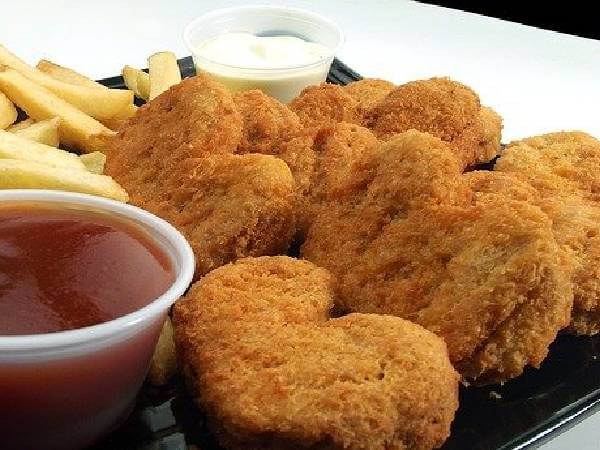
According to multiple studies conducted on different chicken nuggets brands, most chicken nuggets have a disturbingly high-fat content: more than 50% in some cases!
Since these fatty snacks are deep-fried twice, you can see how this fast food delicacy is a nutritional nightmare, especially for dogs. The high sodium content is another factor that makes chicken nuggets an undesirable meal option for your canines.
Here’s how the high fat and sodium content in chicken nuggets affects your dog’s health.
Eating foods high in fats can lead to:
- Lethargy.
- Obesity.
- Cardiac disorders.
- Gastrointestinal issues.
- Diabetes.
- Pancreatitis.
While excessive sodium consumption can lead to the following:
- Dehydration.
- Muscle spasm.
- Hypertension.
- Cardiac disorders.
- Kidney diseases.
- Salt/Sodium poisoning.
That said, let’s look at some common ingredients in Chicken nuggets and see how they contribute to increasing the fat and sodium content of this snack. We’ll also consider any other detrimental effects they can have on dogs.
Fun Fact: While Chicken nuggets are edible for dogs, they are no better than accidentally eating Spoiled meat or food that is high in fat, sodium, sugar, preservatives, or has onion or garlic flavoring.
1. Chicken fat (Contributes to the fat content)
While fat isn’t toxic, dogs should only eat high-fat foods if they have a very active lifestyle. Unless they get plenty of exercise during the day, dogs shouldn’t feast on fatty foods too often.
Chicken nuggets are mostly fat. Even nuggets with the lowest fat contents contain about 20% fat.
Foods this high in fats should only be fed to your dog occasionally.
2. Salt (Contributes to the sodium content)
The sodium content of Chicken nuggets is very high—mainly because of the generous amount of salt that is used.
Just two chicken nuggets have more than enough salt to fulfill an average-sized dog’s sodium needs for the entire day!
3. Oils (Contributes to the fat content)
Chicken nuggets are fried once during production and then again before serving. This gives the tiny snack a high-calorie count.
Also, the cooking oil in fast-food joints is often overused, making it an even bigger health hazard for dogs.
4. Spices and preservatives (Contributes to the sodium content)
Some chicken nugget manufacturers add spices, sauces, and herbs to give their Chicken nuggets extra flavor.
While most of these are safe for human consumption, they may not be suitable for your furry friends. Spices like powdered onion and garlic can be downright toxic for them.
The preservatives added to make the Chicken nuggets last longer can also contain harmful chemicals, including sodium.
5. Flour and breading (Contributes to the fat and sodium content)
While flour and breading are safe for dogs, their coating on chicken nuggets acts as a grease sponge when they are fried. Absorbing lots of cooking oil contributes to the already high-fat content of the Chicken nuggets.
Aside from soaking up grease, the coating also contains seasoning and salt.
Salt increases the sodium content of the snack, while seasoning can contain allergens and ingredients that are toxic to dogs. When feeding your canine companions the Chicken nuggets, it’s best to take the coating off so they are safer for canine consumption.
Hint: Food meant for human consumption such as Pepperoni should be kept away from dogs at all costs because many are highly processed and contain ingredients that are toxic to dogs.
When shouldn’t you feed Chicken nuggets to your dog?
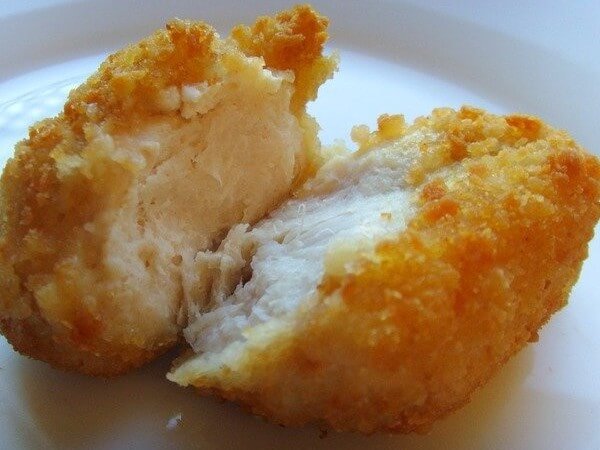
You should keep the Chicken nuggets away from dogs that are:
- Old.
- Have a sedentary lifestyle.
- Overweight.
- Diabetic.
- Are sensitive to sodium.
Chicken nuggets are an unnatural food for dogs and shouldn’t be given to canines suffering from stomach issues.
Just one or two Chicken nuggets would already be packed with enough salt to fulfill your dog’s daily sodium needs.
If your pup has already downed a couple of Chicken nuggets, don’t feed him any more for that day.
Do Chicken nuggets provide nutritional benefit for your dog?
No, Chicken nuggets do not provide any nutritional benefit for your pup.
Chicken nuggets are a high-calorie food that does more harm than good to your four-legged friends. While they do carry protein, the rest of the harmful ingredients cancel out any benefits they have.
Can dogs eat Chicken nuggets from McDonalds?
Although McDonald’s Chicken McNuggets are free from any questionable ingredients, the fact remains that they are a deep-fried fast food.
McDonald’s McNuggets are still harmful for doggie consumption considering that the breading and coating of the Chicken nuggets are fried in overused oil and may contain flavor or seasoning that is toxic to your pup.
Before you give your pooch the Chicken nuggets from McDonald’s, think again. The Chicken McNuggets may do more harm than good, including raising your canine’s cholesterol and blocking their arteries due to the oil.
If you have to give your pooch one or two Chicken nuggets, we recommend peeling off the breading and batter first (as it is soaked with oil) and let your furry friend eat just the meat inside.
Nutritional value of Chicken nuggets from McDonald’s
A single McNugget contains 48 calories. McDonald’s Nuggets usually come with 6 pieces. An adult 25-pound dog needs just 625 calories a day. Considering that, a single serving of 6 piece chicken McNuggets fulfills about 46% of the dog’s daily caloric needs.
This is way too high of a percentage with little to no nutritional value for a small or medium dog breed.
If you have a large dog breed like a Labrador that weighs 75 pounds, then his or her daily calorie intake should only be 1,875. This means that a single serving of 6 piece nuggets would fill about 15% of the dog’s daily calories.
Please avoid feeding your dogs McDonald’s nuggets as their main meal. If you must, these nuggets should only be used as a treat. Keep in mind the 90/10 rule, which is that treats should only make up 10% of your pup’s total daily food intake. In both examples of the small and large dogs, eating one serving of McDonald’s nuggets would go over the 10% treats rule.
If you must, only give your pooch one to two chicken nuggets. Keep in mind your dog’s size. If you have a small dog breed like a Chihuahua, even one or two nuggets may harm them.
Also, note that a single McNuggets contains 75mg of sodium. Too many McNuggets will easily exceed the dog’s daily sodium requirement.
Fun Fact: A single cup of Cheese balls contains 151 calories.
What happens if my dog eats McDonald’s Chicken nuggets?
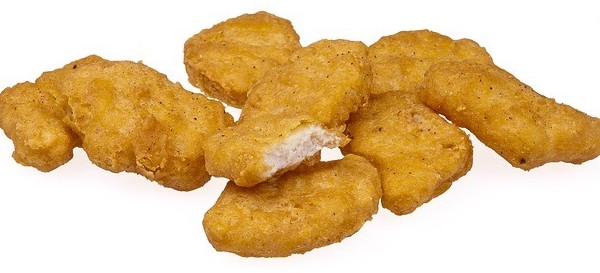
Avoid letting your dog eat more than a few nuggets. The high fat, sodium, carbohydrates, sugar, seasonings, and artificial preservatives content can cause the following:
- Dehydration.
- Gastric issues.
- Diabetes.
- Heart conditions.
- Clogged arteries.
If you seen the documentary Supersize Me, you’ll know that there is very little nutritional value in the McDonald’s food. Eating it for every meal can cause health issues like weight gain.
If your canine has existing diabetes or heart problems, avoid feeding him Chicken nuggets as it may do more damage to his health. If you must, peel off the batter and only give him the meat portion of the Chicken nuggets.
Generally, if your furry friend’s has any existing health condition, it’s best to avoid Chicken nuggets altogether.
The overused oil that contains a lot of bad fats like saturated and trans fat is terrible for dogs.
So it’s best to stick to dog food. As you may be aware, dog food is specifically designed for dogs. It has all the essential nutrients that will benefit the dog’s health, growth, development, and happiness.
Can dogs eat Chicken nuggets from Wendy’s?
Not more than a couple of Chicken nuggets. Wendy’s Chicken nuggets contain 42 calories per nugget. A serving of 10 nuggets would fulfill about 67% of a 25-pound dog’s daily calorie needs.
Their sodium content is also on the higher side at 95mg per nugget.
Can dogs eat Chicken nuggets from Burger King?
Not more than one Chicken nugget. A single nugget from Burger King contains 48.2 calories, which is a lot. A serving of 10 nuggets would fulfill 69% of the calorie needs of a 25lb dog.
Burger King Chicken nuggets also have 100mg sodium per nugget which is quite high.
Can dogs eat Chicken nuggets from Chick-fil-A?
No, dogs should not eat Chicken nuggets from Chick-fil-A.
Chick-fil-A Chicken nuggets contain garlic powder which is toxic to dogs. Although 32 calories per nugget are lower than many others on the list, Chick-fil-A chicken nuggets have a very high sodium content at 152mg per nugget.
A couple of nuggets can exceed the dog’s sodium intake requirements and cause health issues. A 25-pound dog can get about 46% of his daily calorie needs from just 10 Chick-fil-A nuggets.
Can dogs eat Tyson Chicken nuggets?
No, dogs should not eat Tyson Chicken nuggets.
Tyson chicken nuggets contain dried onion and dried garlic, both of which are toxic to dogs.
Fun Fact: Onion and garlic are extremely harmful to dogs. Avoid feeding your canines any food like Lasagna that contains a high amount of garlic and onions.
Can dogs eat frozen Chicken nuggets?
Frozen Chicken nuggets are fried only once, which makes them slightly less harmful than deep-fried nuggets. However, the high salt and fat contents make frozen nuggets unsuitable for dog consumption.
Can dogs eat vegan Chicken nuggets?
No, dogs should not eat vegan Chicken nuggets.
Chicken isn’t the ingredient that makes nuggets unhealthy for dogs. Vegan nuggets substitute chicken for processed wheat while the rest of the ingredients remain unchanged, making them no healthier than regular chicken nuggets.
Vegan nuggets also contain a high amount of salt, spice, and the worst culprit of all, garlic and onion.
Additionally, watch out for soy which is an ingredient that is commonly used to substitute the chicken meat. Many dogs are allergic to soy so it’s best to keep vegan Chicken nuggets away from your pups.
Can dogs eat Quorn Chicken nuggets?
No, dogs should not eat Quorn Chicken nuggets.
Like other vegan nuggets, Quorn uses a wheat substitute for chicken meat. Considering that chicken isn’t the problematic ingredient in nuggets, Quorn vegan nuggets are just as harmful to dogs as regular chicken nuggets.
Can dogs eat Birds Eye Chicken nuggets?
No, dogs should not eat Birds Eye Chicken nuggets.
Birds eye Chicken nuggets contain onion and garlic powders, both of which are toxic for dogs.
Are homemade Chicken nuggets safe for dogs? Or should dogs resort to plain chicken?
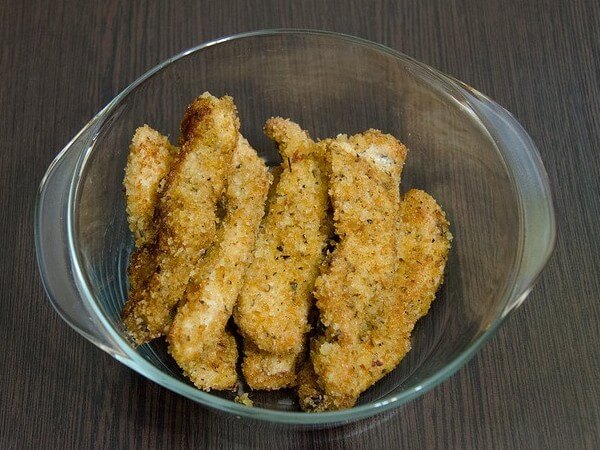
If you’re going to make dog-friendly chicken nuggets at home, they shouldn’t be deep-fried or have any seasoning. Unseasoned, non-fried chicken nuggets are technically plain chicken mince.
Instead of going through the trouble, we recommend just giving your dog plain boiled chicken.
What if my dog accidentally ate a Chicken Nugget?
Just one Chicken nugget won’t harm your dog. Despite being unhealthy, Chicken nuggets are not toxic. Your dog should be fine after eating just one.
Symptoms to Watch For
If your canine friends have munched on a bunch of Chicken nuggets, you can expect lethargy, bloated stomach, vomiting, and diarrhea. However, keep a lookout for sodium poisoning and garlic or onion toxicity symptoms.
Symptoms for sodium poisoning include:
- Excessive urination.
- High fever.
- Muscle spasm.
- Runny stool.
- Weakness.
- Convulsions.
- Dizziness.
Symptoms for onion or garlic toxicity include the following:
- Breathing problem.
- Vomiting.
- Weakness.
- Decreased appetite.
Consuming a bunch of Chicken nuggets can also cause dehydration in dogs. Your pooch will be very thirsty so it’s best to provide him with fresh water nearby so he can have easy access to it. Avoid giving your pup carbonated water like Sprite as this may make the situation worse.
Treatments if your dog has Chicken nuggets poisoning
If your pooch is elderly or has pre-existing medical conditions, you should immediately take them to the vet if they’ve eaten a few chicken nuggets. Owners should be extra careful when giving fast food to their canines, especially if the dogs have diabetes, heart troubles, or sodium sensitivity.
If your four-legged friend doesn’t have any previous health issues but has devoured plenty of Chicken nuggets, you would still need to call your vet immediately. Vomiting or diarrhea is to be expected and will help cleanse your pup’s stomach.
What are some dog-friendly and safe non-toxic Chicken nuggets alternatives?
Your canine companions may love Chicken nuggets, but you should always put their health first.
Feeding your pups Chicken nuggets, even as an occasional treat, is unnecessary and potentially harmful. Instead, you can give your dog one of these natural healthy alternatives:
- Bananas: they’re an excellent source of potassium and vitamins. You can also sun-dry banana slices to make them crunchier.
- Apple: Apples are high in natural sugars and fiber. Slice them up and remove seeds before giving them to your dog.
- Pumpkin: it is a superb source of fiber and helps keep the dog’s digestive system and immunity in top form.
- Carrots: Carrots are crunchy and sweet sources of vitamins. Chop them into bite-sized chunks to make them easier to eat.
- Plain chicken: if your dog likes chicken, just feed them boiled, deboned chicken. It is perfectly safe and healthy.
- Natural doggy treats: you can find plenty of yummy treats for your dog from the local store and online. These treats are perfectly safe for canine consumption. These treats are just as tasty as chicken nuggets while having none of the drawbacks.
Speaking of natural doggy treats, we give our two furry family members the following treats whenever we are enjoying some Chicken nuggets. Our two pups love these chicken snacks:
So, can dogs eat Chicken nuggets?
Chicken nuggets are one of the unhealthier fast foods for dogs. Feeding them to your pooch occasionally is fine, but don’t make it a regular thing.
You may think your pups love Chicken nuggets, but they don’t know what is best for them; you do. Give your canine friends healthier snack options instead of this fatty, oily, and unwholesome food.
Related Questions
Chicken nuggets have a needlessly high-fat content. They’re fried once during manufacturing and then again when serving.
All this frying increases the fat proportions even further, making Chicken nuggets even more harmful. Eating high-fat foods regularly puts dogs at risk of pancreatitis.
Chicken nuggets are bad, whether they are hot or cold.
According to USDA, McDonald’s McNuggets that have been sitting out in the open for four hours or more should be thrown away.
In the refrigerator, they might last longer than a day or two. Cold McNuggets that have been left out for too long can upset your dog’s stomach.
Yes, you can give your dog Chicken nuggets. But like all fast foods, Chicken nuggets should only be consumed occasionally. Also, never feed Chicken nuggets to a dog with pre-existing cardiac issues.
The breaded outer layer is one of the unhealthiest parts of the Chicken nugget. It’s best to remove or peel off the breading before feeding Chicken nuggets to your dog.
DISCLAIMER: THIS WEBSITE DOES NOT PROVIDE MEDICAL ADVICE
The information, including but not limited to, text, graphics, images and other material contained on this website are for informational purposes only. No material on this site is intended to be a substitute for professional veterinary advice, diagnosis, or treatment. Always seek the advice of your veterinarian or other qualified health care provider with any questions you may have regarding dietary needs.
Resources:
https://en.wikipedia.org/wiki/Chicken_nugget
https://www.priceofmeat.com/448/chicken-nugget-facts/

With over five years of specialized experience as an animal writer, my expertise lies in dog nutrition, health, behavior, grooming, and training. I am dedicated to delivering helpful and informative content that caters to the well-being of our furry friends. My primary goal is to empower pet owners with knowledge and ensure our canine companions thrive in health and happiness. In my free time, I love volunteering at local dog rescue centers.
